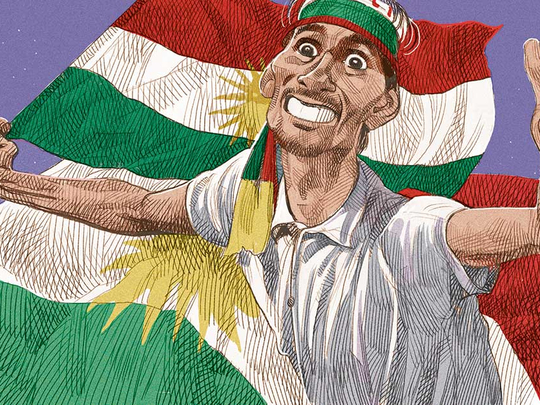
Iraqi Kurdistan’s independence referendum is set for today. Our allies — the United States, Britain, France and the United Nations — keep calling on us to forgo the referendum and to engage, yet again, in negotiations with Iraq. We are grateful to our friends for their efforts, but the time has come for us to secure our own long-term security, prosperity and stability. The path is not clear, but we know it ends in Kurdistan’s independence — in the best-case scenario, by mutual agreement with Iraq.
Yes, we have a choice. We can either go ahead with our symbolic vote, which has the potential to generate serious backlash from the countries that oppose it, or we can accept a proposed set of commitments from our allies, the most powerful nations in the world, in return for postponing the referendum. As it happens, though, we Kurds have a long and vivid memory of the many betrayals our people have suffered throughout history. For this reason, it is not at all clear to us that postponement is in our nation’s best interest.
While our allies disagree with our emphasis on a referendum as a first step to independence, this right is enshrined in international law and complies with Iraq’s constitution. We have yet to hear of a commitment to an alternative process that would definitively result in improved governance or eventual independence for Kurdistan. And we have seriously weighed the risks of holding a referendum. Who, indeed, could be more aware of them than us?
Some of our friends are asking us to remain part of a country that has been unable to defend its territory from the homegrown terrorists of Daesh [the self-proclaimed Islamic State of Iraq and the Levant] who so recently ravaged our lands — a country that has mismanaged its resources and has failed to pay us the mutually agreed share of the national budget.
As a result, over the past few years, Baghdad has brought Kurdistan to its knees financially, rendering us unable to pay our civil servants or the peshmerga soldiers defending Iraq and the world from Daesh. We are now hosting well over 1 million displaced Iraqis, as well as more than 200,000 Syrians who have fled sectarian violence and come to our region for protection. Yet the Iraqi government has refused to send funding to care for those citizens either. Rather than trying to convince us not to leave Iraq, the world should have tried harder to ask Iraq to convince us to stay.
Yes, Kurdistan’s democracy is imperfect; our governance, institutions and political leadership have their flaws. But we are committed to economic prosperity, to transparency and accountability, and, above all, to the safety and protection of our citizens. We have far more of the building blocks for new institutions in place than many other new nations.
Pluralistic society
We invite you to help us strengthen our institutions. Press us for progress on democracy and human rights. We have been working for years on reforms that will put us in a strong position to govern for the well-being of our citizens and the strength of our nation. Nobody pressured us to do this. We ourselves recognised what we needed to do for our survival, despite our lack of the tools and instruments that sovereign nations have at their disposal. We are an open, tolerant and pluralistic society that accepts — no, protects — all groups. We aim to be an independent, peaceful and stable nation, with positive political, economic and security relations with our neighbours, and, most important, with Iraq.
You can see the excitement among our young people celebrating Kurdistan’s referendum and contrast that passion with their counterparts across the Middle East, where radicalism festers. While our people have a range of views about the referendum and the best path forward, in the heart of every Kurd we are already independent. We are already a nation.
We did not hesitate to join the international coalition and the Iraqi forces that set out to liberate Mosul from Daesh. Nor did we hesitate before that to fight Al Qaida, or before that, Saddam Hussain. But we are not mercenaries, paid to fight wars. Our lives are on the line, and we, too, have our strategic and national interests. We didn’t think twice about opening our doors to those displaced by conflict, despite our own economic problems.
Despite all this, rather than recognising or rewarding us, other nations have joined forces to oppose our right to self-determination. Where were you when we were being slaughtered, attacked with chemical weapons and buried in mass graves in 1988? How long did it take you to respond to our pleas when we fled to the mountains after Saddam crushed our uprising in 1991?
Every Kurd around the world shook with fear and indignation at the predicament of our brothers and sisters on the top of Mount Sinjar in 2014. The wounds of past persecution and genocide are fresh in our hearts and minds. It is no wonder that Israel, a nation created as a haven for the survivors of the world’s most tragic genocide, is alone in publicly supporting the referendum, though we have no diplomatic relations with it.
We remain grateful for the international coalition’s support in defending Kurdistan from Daesh. But as that support now appears at risk, we find ourselves sadly reviving an old saying: “The Kurds have no friends but the mountains.” Vague commitments with exit clauses do not address the desires of our people. It is time for our international partners to seriously chart out a path that resolves the Kurdish question in Iraq and gives our people what you already enjoy, and what we deserve: a country of our own.
— Washington Post
Qubad Talabani is deputy prime minister of the Kurdistan Region of Iraq.










